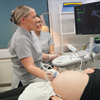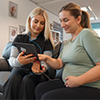Pregnancy is a life-changing journey filled with excitement, preparation – and sometimes, a few health concerns. While most pregnancies progress safely, some conditions can arise that require medical attention. Being informed and knowing what signs to look out for can make all the difference in keeping both you and your baby healthy.
In this blog, we break down some of the most common pregnancy-related health conditions, how they are diagnosed, and what NHS care and support are available.
1. Gestational Diabetes
What is it?
Gestational diabetes occurs when your body cannot produce enough insulin to meet the extra needs during pregnancy, leading to high blood sugar levels.
When is it diagnosed?
Usually between 24 and 28 weeks through a glucose tolerance test if you’re considered at risk.
Symptoms:
Most women won’t notice symptoms, but some experience:
- Increased thirst
- Needing to wee more often
- Tiredness
Potential complications:
- High birth weight (macrosomia)
- Induction or caesarean section
- Risk of your baby developing obesity or type 2 diabetes later in life
Management:
- Healthy diet and regular physical activity
- Blood sugar monitoring
- Medication or insulin, if necessary
🔗 NHS guide to gestational diabetes
2. Preeclampsia
What is it?
Preeclampsia is a condition that causes high blood pressure and protein in the urine, usually after 20 weeks of pregnancy. It can affect both mother and baby if left untreated.
Symptoms to watch for:
- Swelling in the face, hands, or feet
- Severe headaches
- Vision problems
- Pain below the ribs
- Sudden weight gain
Risks:
- Slowed growth of the baby
- Premature birth
- Placental abruption
- Eclampsia (seizures)
Treatment:
- Regular monitoring
- Medication to lower blood pressure
- Early delivery if the condition becomes severe
3. Anaemia in Pregnancy
What is it?
Anaemia means you don’t have enough red blood cells or haemoglobin to carry oxygen around the body, most commonly due to iron deficiency during pregnancy.
Symptoms:
- Fatigue or weakness
- Pale skin or lips
- Shortness of breath
- Dizziness or light-headedness
Risks if untreated:
- Premature birth
- Low birth weight
- Increased risk of infection
Treatment:
- Iron-rich diet (e.g. red meat, leafy greens, fortified cereals)
- Iron supplements (recommended by your midwife or GP)
🔗 NHS guide to anaemia in pregnancy
4. Hyperemesis Gravidarum (Severe Morning Sickness)
What is it?
Hyperemesis gravidarum is an extreme form of morning sickness causing severe nausea and vomiting, leading to dehydration and weight loss.
Symptoms:
- Inability to keep food or fluids down
- Persistent vomiting
- Weight loss
- Dehydration (dry mouth, dark urine)
Risks:
- Nutritional deficiencies
- Need for hospital admission
Treatment options:
- Anti-sickness medications (prescribed by a GP or midwife)
- IV fluids in severe cases
- Small, frequent meals and plenty of rest
🔗 NHS guide to hyperemesis gravidarum
5. Placenta Praevia
What is it?
Placenta praevia occurs when the placenta lies low in the uterus and covers all or part of the cervix. This can cause bleeding in later pregnancy and may affect the type of birth you can have.
Symptoms:
- Painless vaginal bleeding in the second or third trimester
Risks:
- Bleeding before or during labour
- Preterm birth
- Need for planned caesarean section
Management:
- Extra monitoring
- Activity restrictions if bleeding occurs
- Planned caesarean delivery if the placenta does not move
🔗 NHS information on placenta praevia
6. Urinary Tract Infections (UTIs) in Pregnancy
What is it?
Pregnant women are more prone to UTIs due to hormonal changes that affect the urinary tract.
Symptoms:
- Pain or burning when weeing
- Needing to wee more often than usual
- Lower abdominal pain
- Cloudy or strong-smelling urine
Risks if untreated:
- Kidney infection
- Preterm labour
Treatment:
- Antibiotics safe in pregnancy
- Drinking plenty of fluids
- Regular check-ups if you’ve had recurrent infections
🔗 NHS guide to UTIs in pregnancy
When to Seek Medical Help
You should contact your midwife, GP, or maternity unit immediately if you experience:
- Heavy or persistent vaginal bleeding
- Severe abdominal or rib pain
- Blurred vision or severe headaches
- Swelling of the hands, face, or feet
- Unusual discharge or reduced movements from your baby
For urgent concerns, you can also call NHS 111 for advice 24/7.
🩺 NHS Support & Resources
- 🏥 NHS Pregnancy Hub
- 🤱 Tommy’s Pregnancy Information
- ☎️ NCT Pregnancy & Birth Helpline
- 👩⚕️ NHS 111 Service – for 24/7 non-emergency advice
- 📞 In an emergency, always call 999 or go to your nearest A&E department
⚠️ Important Disclaimer
This blog is intended for informational purposes only and does not replace professional medical advice. Every pregnancy is different, and conditions can vary in severity. If you are experiencing symptoms or have any concerns about your health or your baby’s wellbeing, always consult your midwife, GP, or maternity team immediately.
For urgent medical advice, call NHS 111.
In case of an emergency, call 999 or go to A&E.













 Packages & Prices
Packages & Prices  Important Info & Policies
Important Info & Policies  Your Scan
Your Scan